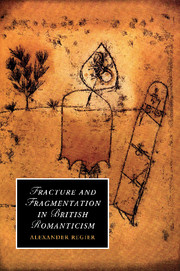Book contents
- Frontmatter
- Contents
- Acknowledgements
- List of abbreviations
- Broken origins: an introduction
- 1 A brotherhood is broken: Babel and the fragmentation of language
- 2 Figuring it out: the origin of language and anthropomorphism
- 3 Forces trembling underneath: the Lisbon earthquake and the sublime
- 4 A blue chasm: Wordsworth's The Prelude and the figure of parenthesis
- 5 Letters from the grave: John Keats's fragmented corpus
- 6 The doubling force of citation: De Quincey's Wordsworthian archive
- 7 Philological fractures: Paul de Man's Romantic rhetoric
- Notes
- Bibliography
- Index
- CAMBRIDGE STUDIES IN ROMANTICISM
1 - A brotherhood is broken: Babel and the fragmentation of language
Published online by Cambridge University Press: 06 July 2010
- Frontmatter
- Contents
- Acknowledgements
- List of abbreviations
- Broken origins: an introduction
- 1 A brotherhood is broken: Babel and the fragmentation of language
- 2 Figuring it out: the origin of language and anthropomorphism
- 3 Forces trembling underneath: the Lisbon earthquake and the sublime
- 4 A blue chasm: Wordsworth's The Prelude and the figure of parenthesis
- 5 Letters from the grave: John Keats's fragmented corpus
- 6 The doubling force of citation: De Quincey's Wordsworthian archive
- 7 Philological fractures: Paul de Man's Romantic rhetoric
- Notes
- Bibliography
- Index
- CAMBRIDGE STUDIES IN ROMANTICISM
Summary
NATURE'S MOURNING AND WORDSWORTH'S THE RUINED COTTAGE
And the Lord said, Behold, the people is one, and they have all one language; and this [the building of the Tower of Babel] they begin to do: and now nothing will be restrained from them, which they have imagined to do. Go to, let us go down and there confound their language, that they may not understand one another's speech. So the LORD scattered them abroad from thence upon the face of all the earth: and they left off to build the city. Therefore is the name of it called Babel; because the LORD did there confound the language of all the earth: and from thence did the LORD scatter them abroad upon the face of all the earth.
(Gen. 11.6–9)The story of the Tower of Babel is one of the most poignant and powerful images for the fragmentation of language. It is a condensed trope of an ideal Language of plenitude and understanding being broken, scattering with its fragmentation peoples, their communication with each other, and their position as subjects in the natural world. This first chapter will use the image of Babel to explore several different dimensions of linguistic fracture and scattering, and think about how they are negotiated in the poetry of William Wordsworth. It proposes to understand Babel as a trope or conceptual springboard that goes further than the first narratorial layer of the biblical story.
- Type
- Chapter
- Information
- Fracture and Fragmentation in British Romanticism , pp. 30 - 51Publisher: Cambridge University PressPrint publication year: 2010



